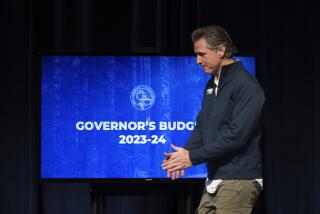Release of 1991 Budget to Be Delayed a Week
- Share via
WASHINGTON — The Bush Administration announced Tuesday that it will be a week late in submitting its first full-year budget, and budget chief Richard G. Darman placed part of the blame for the delay on Congress.
The delay in the 1991 fiscal budget also will push back President Bush’s first State of the Union address from Jan. 25 to Jan. 30, according to Administration and congressional sources who spoke on condition of anonymity.
Darman, in letters to House and Senate leaders, suggested that late congressional action on fiscal legislation made it impossible to meet the deadline set by budget law even though the budget staff worked through the Christmas and New Year’s weekends.
“Unfortunately . . . we simply cannot deliver the budget by the 22nd of January, and will have to delay its submission until Jan. 29th,” Darman, director of the Office of Management and Budget, said in a letter to House Speaker Thomas S. Foley (D-Wash.).
In a separate letter to Senate Majority Leader George J. Mitchell (D-Me.), Darman said that budgets have been late “many times before. But I hope you may appreciate that I would have preferred to have been exactly on time, rather than seven days late.”
Darman said the principal reason for the seven-day delay was that appropriations bills and a major budget-cutting “reconciliation” bill were late.
The reconciliation bill, which reconciles actual spending with deficit-reduction targets, cut some $14.7 billion from the 1990 fiscal deficit. It was one of the final measures enacted before Congress began its two-month year-end recess before Thanksgiving.
Congress reconvenes Jan. 23, but most members do not get back to work until the State of the Union is delivered. Bush wanted to give the address Jan. 25, but the budget setback prompted the delay in the speech to a joint House-Senate session, sources said.
Administration sources said the budget, for the 1991 fiscal year that begins Oct. 1, will call for $1.23 trillion in spending to meet a $64-billion budget-deficit target without proposing new taxes or wholesale cuts in domestic programs.
More to Read
Get the L.A. Times Politics newsletter
Deeply reported insights into legislation, politics and policy from Sacramento, Washington and beyond. In your inbox twice per week.
You may occasionally receive promotional content from the Los Angeles Times.










